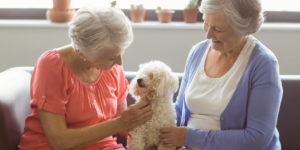ConnectedLiving launches new learning center for seniors
Senior care residents and caregivers now have a new online resource to help them stay connected, learn about the aspects of healthy aging and become better champions of their own wellness.
ConnectedLiving, Quincey, Mass., launched its University this week, offering programming that allows seniors to learn, explore and fulfill intellectual and spiritual needs. Wellness programs, educational sessions on health topics, memory exercises and more than 150 discussion groups are available.
Family members, caregivers and residence staff also are welcome to use the programming and webinars to learn more about conditions that affect older people—and how to engage in healthy conversations about such topics.
The University is an extension of the ConnectedLiving Network, which provides access to the Internet, social media tools, video chat and email. The idea is based on empowerment and enrichment, while giving seniors a sense of community beyond the walls of their residences and family units, the company says.
"The goal is to get seniors engaged and connecting to the people and the experiences that are important to them, regardless of physical distance," says Anna Hall, VP of ConnectedLiving University, in a press release. "For many seniors, distance was seen as an impenetrable barrier, but with technology and the training that accompanies it, no distance is too great. ConnectedLiving University brings all parties together to transform the experience of aging."
The company’s network currently has 20,000 users across 28 states, most of whom are residents of senior living communities or public housing.

Pamela Tabar was editor-in-chief of I Advance Senior Care from 2013-2018. She has worked as a writer and editor for healthcare business media since 1998, including as News Editor of Healthcare Informatics. She has a master’s degree in journalism from Kent State University and a master’s degree in English from the University of York, England.
Related Articles
Topics: Activities , Alzheimer's/Dementia , Executive Leadership , Rehabilitation











